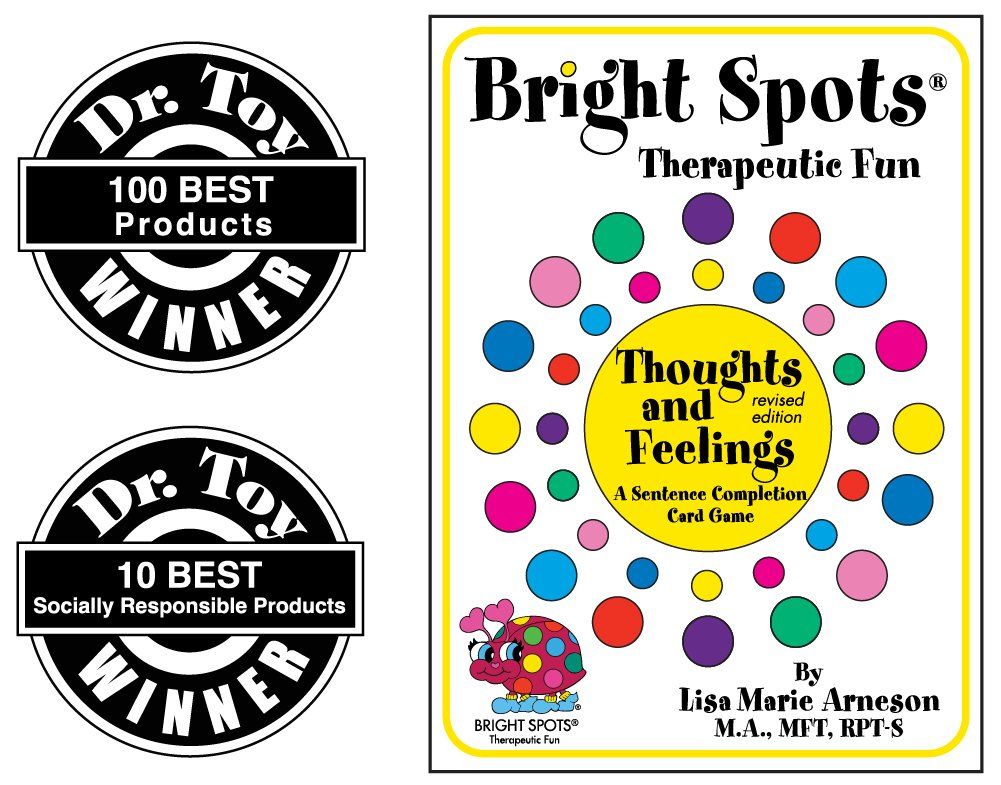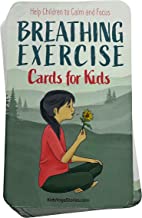How To Celebrate International Play Therapy Week in Your Homeschool (Gameschooling)
I am an Amazon Affiliate. See my Disclaimer for more information.
You know playing with your child can be fun, but did you also know it can be therapeutic?
In honor of International Play Therapy Week, we would like to share with you our top card games for helping children learn to regulate their emotions.

All the Feels
Feelings.
Many are wonderful. Others not so much. And some, are quite painful.
As adults, we have the benefit of life experience to guide us through the murky waters of powerful emotions. Most of us do not notice when we tackle tough situations without fanfare. Life runs smoothly and we are simply along for the ride.
But what about the times when our coping skills fall short? The instances when we do not conquer our challenges with tact and grace?
What do we do when our feelings are TOO BIG?
So big until we end up reacting when what we really want to do is respond.
We label the BIG FEELINGS that precipitated our unwanted actions as “right” or “wrong.” We try to avoid, deny, or even wrestle with them.
We want to be in control of how we feel because it makes us feel safe.
And when it comes to our children? We unconsciously do the same.
To be a parent means to know what it feels like to have your heart walking around outside of your body.
When our children hurt, we hurt. When they struggle or suffer, we struggle and suffer right along with them. It is our parenting instinct to nurture. To protect.
We dash to distract.
We rush to redirect.
We scramble to soothe.
Anything to assuage the ache.
Truthfully, feelings are neither “good” nor “bad.”
Feelings just are.
(For a bit of background on emotional regulation, including how feelings, thoughts, and actions interact, check out my blog post here.)
What Does It Mean to “Regulate” Emotions?
Surrendering to sentiment, however, does not mean we are absolved of responsibility for our actions. While feelings in and of themselves are not harmful, what we do with them can be. The actions we take in response to our inner feelings are where the real power lies.
So how exactly do we regulate our responses?
Do we need a barometer? A thermometer? An emomometer?
(Ok, I made that last one up.)
Not quite. We use a “gauge” of sorts. While not as precise a tool as the first two “meters,” it is certainly as powerful.
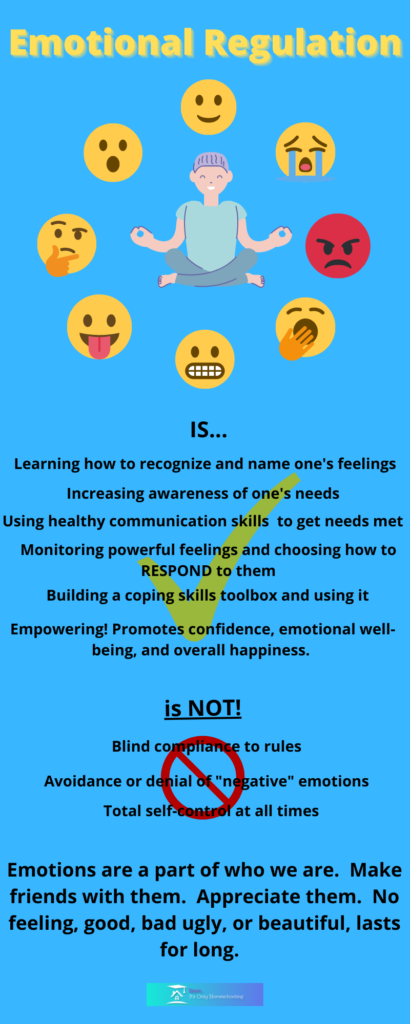
The Feelings-Thoughts-Behaviors Connection
In between our feelings, our thoughts, and our actions, there are very brief windows of opportunity.

Between stimulus and response there is a space. In that space is our power to choose our response. In our response lies our growth and our freedom.
Viktor Frankl
It is in THESE moments that we hold all the POWER. We call it the Power of the Pause.
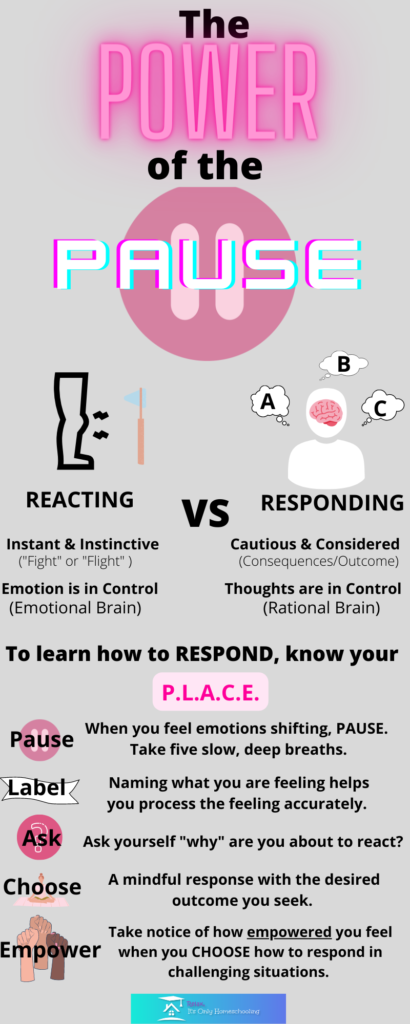
Essentially, learning to respond rather than react empowers. It teaches us that we can withstand any emotion, pleasant or unpleasant, as no emotion lasts for long. Through practicing the Power of the Pause, children (and adults) learn self-control, problem-solving, and relaxation with the rewards being higher self-esteem, improved social skills, and enhanced frustration tolerance. For a more in-depth discussion of The Power of the Pause, including the P.L.A.C.E. technique, check out my blog post here.
The Power of Play
So, how do we teach our kiddos emotional regulation skills? We speak their language of course! We harness the power of play.
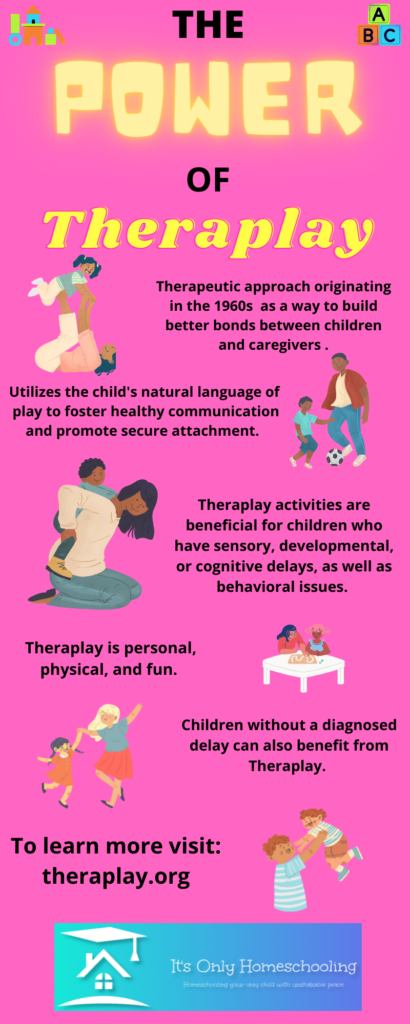
As a homeschooling mom of a child with learning differences, I may have only one student but believe me, there are days when my solitary pupil is off-task and roaming the hall. There are days when it feels like I am on an endless roller coaster cycle of redirecting to the task at hand, offering gentle words of encouragement, restating firm reminders, or wrapping up in bear hugs of comfort when we are both reduced to tears because handwriting has gotten the best of us.
I may be a licensed therapist with years of training and a cache of therapy tools to spare, but in those moments, I am just a mom.
A mama bear who loves her cub with a ferocity I never knew existed in my pre-mommy days.
And when my cub hurts? I hurt.
So what do we do on the days when we want to throw in the towel as homeschoolers?
We play.
We give ourselves little bursts of “fun timeouts” sprinkled throughout the day. Mini “brain breaks” of silly and joy just long enough to remind ourselves of why we chose to do this homeschooling thing, to begin with.
It’s all about relationship. The bond we share as a family of faith in faith is far greater than any lesson from a textbook.
Card Games to Teach Emotional Regulation
Here are the top card games that we use to teach emotional regulation in our home.
Breathing Exercise Cards for Kids
Find & Seek
To learn more about these games and how we use them in our home, check out our YouTube channel.
Let’s Keep In Touch
Try out a few of these great “brain break” emotional regulation activity card games in your home. Let me know how it goes!
Be sure you do not miss a blog post by signing up for my email list, liking my Facebook, Twitter, or Instagram pages, or subscribing to my YouTube channel.
Have a heart for service and love podcasts? Check out our It’s Only Homeschooling Podcast presents the Salt & Light Spotlight. Each month we feature a different community outreach program. Our hope is to bring awareness to the good works of these amazing organizations and encourage support.
You can listen to podcast episodes on YouTube, Podbean, Spotify, iHeartRadio, Samsung, PlayerFM, or right here on our website.
Like what you see here? Sharing is caring!
Blessings,
Kimberly
IOH Mom
This website is not a professional counseling website and nothing here should be construed as professional counseling advice. Although Kimberly Bennett, LPC is a Licensed Professional Counselor, she is not your counselor, and no counselor-client relationship is established unless she has signed an agreement with you. All information provided through this website is for informational and educational purposes only. This post may contain affiliate links. Please read my disclosure statement. Thanks for visiting!
